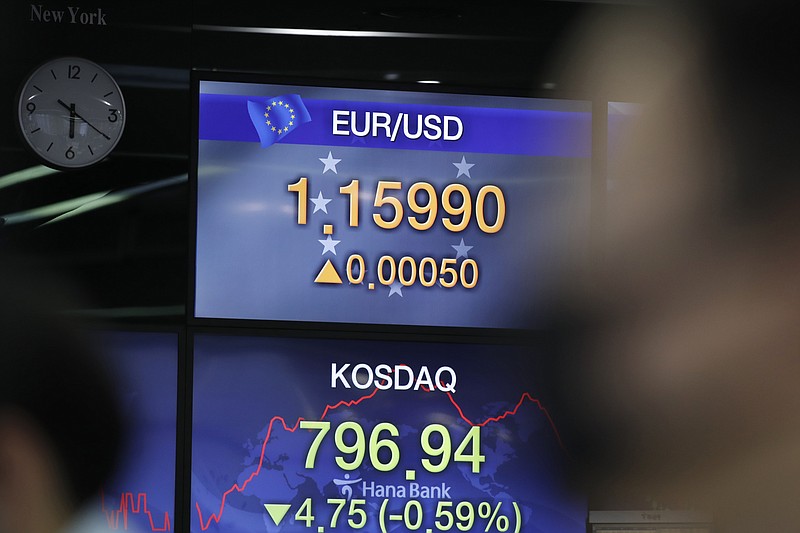Stocks fell Friday on Wall Street as tensions flared again between the world's two largest economies. Jitters continued over the fallout from the coronavirus and companies turned in a mixed batch of earnings. The S&P 500 lost 0.6 percent.
The Dow Jones Industrial Average was down 166 points, or 0.6 percent, at 26,490, and the Nasdaq composite slid 0.9 percent. Each of the indexes had been down more sharply in the morning, with the Nasdaq off by as much as 2.3 percent.
Technology and health care companies accounted for much of the selling, with chipmaker Intel posting the biggest drop in the S&P 500. Those losses outweighed gains by companies that rely on consumer spending, including homebuilder PulteGroup and retailers Target and Best Buy.
Markets fell more sharply across Asia and Europe after China ordered the closure of the U.S. consulate in the western city of Chengdu. All the uncertainty helped gold rise to a record closing high of almost $1,900 an ounce, beating the all-time high it set in 2011. Treasury yields were holding relatively steady, but they remain close to their lowest levels since April.
"Investors are already wondering whether prices are too high and then you get a little bit of tension with China, you get a little bit of disappointing news from Intel, and that just sort of feeds on itself," said Mike Zigmont, director of trading and research at Harvest Volatility Management.
The coronavirus pandemic remains the most dominant force in markets, with its potential to destroy lives and economies. But other risks are also bubbling up, headlined by Friday's worsening relations between the United States and China.
Investors are also concerned about a recent uptick in layoffs as spiking coronavirus counts across the Sun Belt lead more businesses to shut down. Extra benefits for those out-of-work Americans from the federal government are set to expire soon, and worries are rising about whether Congress can reach a deal on more aid for the economy. Nearly half of Americans whose families experienced a layoff during the pandemic believe those jobs are lost forever, according to a poll from the Associated Press-NORC Center for Public Affairs Research.
Despite all those challenges, the S&P 500 remains only about 5 percent below its record set in February, after roaring back from an earlier, nearly 34 percent plummet. This week's stall for the S&P 500 follows three straight weekly gains driven by hopes that the economy was regaining its footing. Underlying it all is massive aid for the economy promised by the Federal Reserve, including record-low interest rates.
"The Fed is the big story behind this market, that and the liquidity it's provided," said Teresa Jacobsen, managing director at UBS Private Wealth Management. "It gives a great deal of support for upside in the market. But, there are momentary blips when we pause and give a little back."
On Friday, the blip came after China's Foreign Ministry ordered the closure of the U.S. consulate in the western city of Chengdu. It echoes a similar move earlier this week by the United States to close the Chinese consulate in Houston.
Such moves have investors on edge because of how viciously markets swung in prior years when President Donald Trump was pressing his trade war with China, before they agreed to a temporary truce early this year.
"Alongside the eviction of the Houston Chinese Consulate, the risk of the U.S.-China conflict escalating into a 'Cold War' is worrying," Hayaki Narita, of Mizuho Bank, said.
A speech Thursday by U.S. Secretary of State Mike Pompeo saying "securing our freedom from the Chinese Communist Party is the mission of our time" adds to the rhetoric certain to incense Beijing, making it still more difficult for either side to back down, he said.
Technology stocks have also been in the spotlight, after a sharp slide for them on Thursday helped drag the S&P 500 to its worst loss in nearly four weeks.
Microsoft, Apple, Amazon and other giants have cruised through much of the pandemic on expectations that they can keep growing despite all the challenges for the economy. But critics said enthusiasm for them was overdone, with prices too high even after accounting for the huge profits that they can produce.
Apple was down 0.1 percent after having been down 4 percent earlier in the day. Microsoft slid 0.3 percent. Intel sank 16.2 percent after it delayed the release of its new 7 nanometer chip.
Stock markets in Europe closed lower. France's CAC 40 fell 1.5 percent, and Germany's DAX lost 2 percent. The FTSE 100 in London dropped 1.4 percent. Markets in Asia ended broadly lower.
The yield on the 10-year Treasury held steady at 0.58 percent. It tends to move with investors' expectations for the economy and inflation.
Gold rose 0.4 percent to $1,897.50 per ounce. It briefly climbed above $1,900 per ounce for the first time in nearly nine years. Benchmark U.S. crude rose 22 cents to $41.29 per barrel. Brent crude, the international standard, gained 3 cents to $43.34 per barrel.

